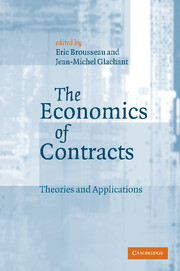Book contents
- Frontmatter
- Contents
- List of figures
- List of tables
- List of contributors
- Acknowledgments
- Part I Introduction
- Part II Contracts, organizations, and institutions
- Part III Law and economics
- Part IV Theoretical developments: where do we stand?
- Part V Testing contract theories
- 16 Econometrics of contracts: an assessment of developments in the empirical literature on contracting
- 17 Experiments on moral hazard and incentives: reciprocity and surplus-sharing
- Part VI Applied issues: contributions to industrial organization
- Part VII Policy issues: anti-trust and regulation of public utilities
- Bibliography
- Index of names
- Subject index
16 - Econometrics of contracts: an assessment of developments in the empirical literature on contracting
Published online by Cambridge University Press: 16 January 2010
- Frontmatter
- Contents
- List of figures
- List of tables
- List of contributors
- Acknowledgments
- Part I Introduction
- Part II Contracts, organizations, and institutions
- Part III Law and economics
- Part IV Theoretical developments: where do we stand?
- Part V Testing contract theories
- 16 Econometrics of contracts: an assessment of developments in the empirical literature on contracting
- 17 Experiments on moral hazard and incentives: reciprocity and surplus-sharing
- Part VI Applied issues: contributions to industrial organization
- Part VII Policy issues: anti-trust and regulation of public utilities
- Bibliography
- Index of names
- Subject index
Summary
Introduction
The growth in the analysis of inter-firm contractual relationships that has occurred in recent years is an indication of the importance economists associate with the issue of contracting and contract design. On the theoretical side, understanding how and why economic agents use contracts to coordinate their activities is crucial to understanding the organization and efficiency of economic exchange. For policy-makers, understanding the functions and implications of various contract terms is a prerequisite to distinguishing between efficient and anti-competitive practices and to developing appropriate policies with respect thereto.
Over time, two approaches have come to dominate the analysis of contracting: agency theory and transaction cost economics (TCE). Of the two, agency theory is widely regarded as having had the greater success developing formal models of contracting behavior. But on the empirical side, the assessment is generally reversed. Compared to agency theory, TCE is seen as having been far more successful both at generating testable hypotheses and in explaining actual contracting practices.
In this chapter, we review the empirical research on contracting, with special emphasis on the relative contributions of agency and transactioncost theories, first, in providing structural guidance to empirical researchers and, second, in identifying observable determinants of both the decision to contract and the design of contractual agreements. We begin in section 2 with a description of the underlying structure and specification of contracting and contract duration models, followed by assessments of, first, the contributions of agency and transaction-cost theories to the formulation of hypotheses about contracting decisions and, second, the evidence pertaining to those hypotheses.
- Type
- Chapter
- Information
- The Economics of ContractsTheories and Applications, pp. 273 - 292Publisher: Cambridge University PressPrint publication year: 2002
- 45
- Cited by

